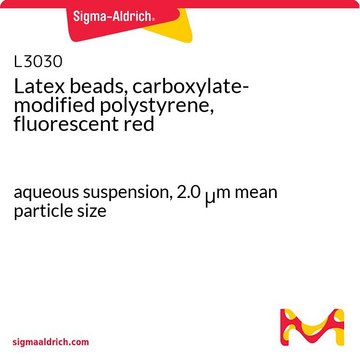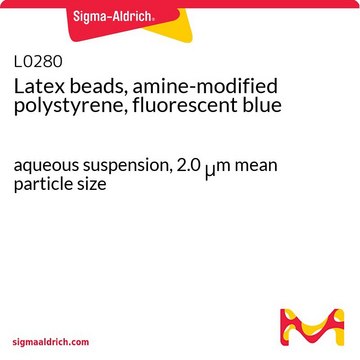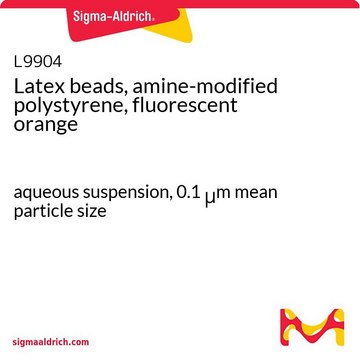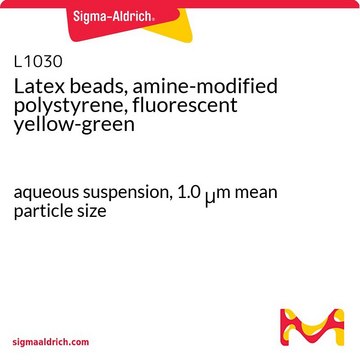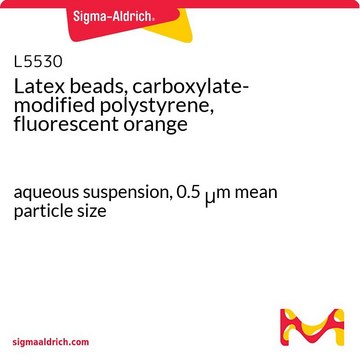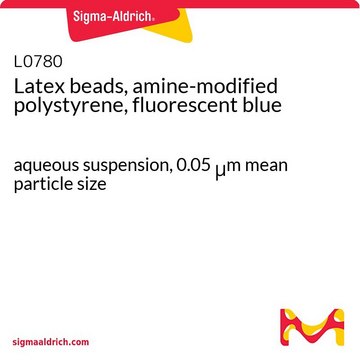L9529
Latex beads, amine-modified polystyrene, fluorescent orange
aqueous suspension, 2.0 μm mean particle size
Autenticatiper visualizzare i prezzi riservati alla tua organizzazione & contrattuali
About This Item
Prodotti consigliati
Forma fisica
aqueous suspension
Livello qualitativo
Composizione
Solids, 2.4-2.6%
Dimens. media particelle
2.0 μm
Fluorescenza
λex ~520 nm; λem ~540 nm
Cerchi prodotti simili? Visita Guida al confronto tra prodotti
Applicazioni
Latex beads, amine-modified polystyrene, fluorescent orange has been used in functionalized microbeads for rapid antimicrobial susceptibility testing (AST) evaluation. It has also been used in microparticle functionalization for the detection of live bacteria.
Azioni biochim/fisiol
Amine-modified polystyrene latex beads have been used to develop an electrochemical nitrite nanosensor as well as to validate a pharyngeal aspiration technique for exposing the mouse lung to respirable particles.
Codice della classe di stoccaggio
10 - Combustible liquids
Classe di pericolosità dell'acqua (WGK)
WGK 3
Punto d’infiammabilità (°F)
Not applicable
Punto d’infiammabilità (°C)
Not applicable
Certificati d'analisi (COA)
Cerca il Certificati d'analisi (COA) digitando il numero di lotto/batch corrispondente. I numeri di lotto o di batch sono stampati sull'etichetta dei prodotti dopo la parola ‘Lotto’ o ‘Batch’.
Possiedi già questo prodotto?
I documenti relativi ai prodotti acquistati recentemente sono disponibili nell’Archivio dei documenti.
I clienti hanno visto anche
J Geys et al.
Toxicology letters, 160(3), 218-226 (2005-09-03)
Recent studies indicate that inhaled ultrafine particles can pass into the circulation. To study this translocation in an in vitro model three types of pulmonary epithelial cells were examined. The integrity of the cell monolayer was verified by measuring the
Ninad Mehendale et al.
Biomedical microdevices, 20(1), 6-6 (2017-12-01)
Pillar-based microfluidic sorting devices are preferred for isolation of rare cells due to their simple designs and passive operation. Dead-end pillar filters can efficiently capture large rare cells, such as, circulating tumor cells (CTCs), nucleated red blood cells (NRBCs), CD4
Jhih-Cheng Wang et al.
ACS sensors, 3(10), 2182-2190 (2018-09-18)
Rapid detection of bacteria and their susceptibility to specific antibiotics plays a vital role in microbial infection treatments. Antimicrobial susceptibility testing (AST) is a common measure to select effective drugs. However, the conventional practices, such as broth dilution, E-test, and
G V S Rao et al.
Journal of toxicology and environmental health. Part A, 66(15), 1441-1452 (2003-07-15)
Recent studies have demonstrated that the mouse lung can be exposed to soluble antigens by aspiration of these antigens from the pharynx. This simple technique avoids the trauma associated with intratracheal instillation. In this study, the pharyngeal aspiration technique was
Electrochemical nitrite nanosensor developed with amine- and sulphate-functionalised polystyrene latex beads self-assembled on polyaniline
Muchindu, M., et al.
Electrochimica Acta, 55, 4274-4280 (2010)
Il team dei nostri ricercatori vanta grande esperienza in tutte le aree della ricerca quali Life Science, scienza dei materiali, sintesi chimica, cromatografia, discipline analitiche, ecc..
Contatta l'Assistenza Tecnica.